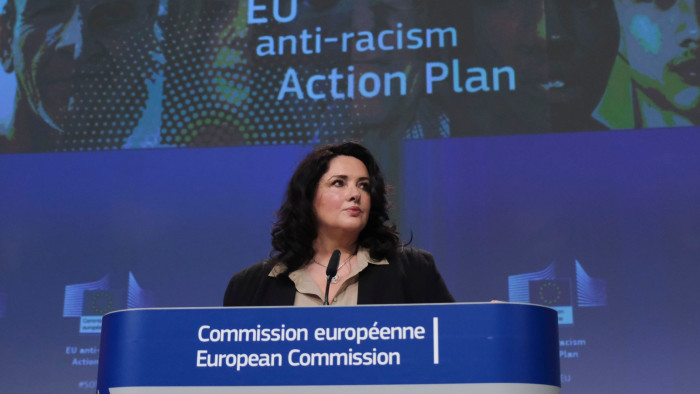
Civil society organisations have written to the European Commission, urging it to drop its criminalisation approach to hatred and engage in more impactful responses.
Dear Commission President Ursula von der Leyen and Commissioner for Equality Helena Dalli,
As the EU’s Anti-racism Action Plan acknowledges, discrimination on the grounds of racial or ethnic origin “persists in our society” – including in expressions of hate-fuelled violence and speech. This is due to the persistence of systemic factors that continue to drive inequality in opportunity and treatment at all levels of society. Some of those factors are related to structural inequities in our criminal justice systems themselves.
In view of this, Fair Trials and partner civil society organisations* raise strong concerns about the European Commission’s initiative to include hate speech and hate crime in the list of EU crimes, which represents a continued overreliance on criminalisation as a policy response to social harm.
We share the Commission’s views about the profound impact of manifestations of hatred on victims and affected communities. We welcome and encourage the political will to counter hatred and protect those made most vulnerable by the systems of oppression at play in our societies, especially given the rollback of human rights and the rule of law in some Member States. We believe the European Commission has a responsibility to act decisively and effectively to tackle discrimination and end the cycle of harm and violence towards women, racialised people, trans and queer people, disabled people, people in poverty, elderly people, migrants, religious minorities, and all other communities impacted by systemic hatred.
We do not, however, believe that increased reliance on the criminal justice system and harsher sentencing offer a meaningful or effective policy response to symptoms of much deeper structural problems. Instead, the proposed expansion of crimes raises serious concerns. We encourage the EU to lead by example and take a different path.
Recent expansion of hate crime laws has not worked: In recent years, EU Member States have strengthened criminal provisions governing hate speech and hate crime, particularly those which target people on account of their ethnicity or race.[1] Despite this, we have witnessed unprecedented levels of racism and xenophobia across Europe in the context of the COVID-19 pandemic.[2] Tougher criminal laws are not leading to more inclusive societies. Instead, they reinforce punishment as a solution based on individual actors and fail to address the systemic production and manifestation of hatred. Other responses are necessary.
Without structural reform, criminal justice agencies cannot effect change: Communities targeted by hate crime are often the same communities who are targeted by law enforcement through over-policing and profiling and have an understandable lack of trust in criminal justice agencies. This makes victims reluctant to report such offences.[3] We need to understand why impacted people are not reporting hate crime, and when they are, whether their complaints are treated diligently.
The reality is that victimhood is too often subject to formal recognition by institutions and authorities that are not properly equipped for the task.
Our research on disparities in the criminal legal systems across Europe shows that justice is not colour-blind, and racialised people are being disproportionately criminalised, policed, held in pre-trial detention, subjected to violations of their procedural rights, and sentenced.[4] Recent ECtHR rulings have similarly shed light on how extreme poverty can be an automatic ticket to prison,[5] and how victimisation and criminalisation are often intertwined in a person’s experience.[6]
We need to engage in a comprehensive reform of our criminal justice systems, rather than entrenching reliance on those systems through the proposed expansion of the list of EU crimes to tackle hate crime. To tackle hatred with a truly intersectional approach, we must engage in structural reform to ensure that institutions are firmly and genuinely grounded in the rule of law and that responses are grounded in the expressed needs and realities of affected communities. We must ensure that they do not hold unchecked power and demand that they be held accountable – for police brutality, judicial errors, biased sentencing, government-endorsed populist discourse, and so many other contributions by our criminal justice system to the mass production of hate across society.
Punitive responses perpetuate the cycle of hatred: Without reform, further criminalisation of hate crime will contribute to the long-standing and ever-deteriorating prison overcrowding crisis across Europe. This crisis results in inhumane and degrading prison conditions with virtually no access to rehabilitation or educational services, which is precisely what people in prison need to support their reintegration into a more inclusive society. In addition, the normalisation of structural violence as part of detention[7] further contributes to an environment where hatred and racism flourish. Without far-reaching reform, punishment reinforces the cycles of violence, hatred, and social exclusion towards the very people this legislative initiative is trying to protect.
The risks of criminalisation on the rule of law: In a system grounded in the rule of law, law enforcement powers must be legally framed with sufficient clarity and certainty to prevent abusive use. The concept of ‘hate’ is vague and open to interpretation – powers based on this concept therefore bear a significant risk of being misused by those who make and apply the law.[8] This risk is all the greater when those who hold these powers are those with privilege and not representatives of the communities that we understand to be the most vulnerable to hate crime and hate speech. We have already seen how existing laws about hate speech are being weaponised against people reporting offences.[9] The EU should seek to support and equip those challenging governments and officials in positions of power who are promoting policies grounded in the hatred of others for tactical, populist purposes.
The focus should be on supporting impacted people and communities: People who have suffered, or who are at the greatest risk of suffering, harm as a result of hatred should be the main beneficiaries of legislative and other measures aiming to tackle such harms. Justice may take many forms other than punishment, including apologies, reparations, holding those who caused harm accountable, and bringing together communities to promote social peace through inclusion. Indeed, criminal penalties are meant to be a last resort. We need more holistic and less punitive approaches to issues of discrimination, bias, and racism.[10]
In conclusion, we urge the EU to acknowledge and take account of the shortcomings of the criminal justice system in responding to hatred, and to prioritise more holistic solutions. We ask that the European Commission create the space for discussion and action to be led by impacted communities, to ensure that efforts are focused on the most meaningful solutions. As the Commission moves forward towards specific anti-racism actions, policies, and initiatives, Fair Trials and its Legal Experts Advisory Board (LEAP)— a coalition of defence lawyers, academics, and civil society organisations from across Europe committed to advancing fair trial rights—stand ready to help.
* This statement is supported by Associazione Antigone, Fem-R and PICUM, whom we thank for all their work. We would also like to acknowledge the openness to dialogue of all other civil society organisations who have been involved in the production of this statement.
[1] Pursuant to the Council Framework Decision 2008/913/JHA of 28 November 2008 on combating certain forms and expressions of racism and xenophobia by means of criminal law, all Member States have internal provisions criminalizing hate speech and hate crime, albeit protecting a restricted number of characteristics. While we take note of the Commission’s concerns regarding the transposition of this Framework Decision in the national legal systems of the Member States, as expressed in its Anti-Racism Action Plan 2020-2025, we contend that the problem goes beyond correct implementation – and rather lies in the punitive nature of the approach taken.
[2] See, e.g., Rights International Spain, The COVID-19 Health Crisis: Racism and Xenophobia during the State of Alarm in Spain, available here. See, also, Margareta Matache, Jacqueline Bhabha, Anti-Roma Racism is Spiraling during COVID-19 Pandemic, Health Hum Rights. 2020;22(1):379-382.
[3] See, e.g., Fair Trials, Uncovering anti-Roma discrimination in criminal justice systems in Europe, November 2020.
[4] Fair Trials, Disparities and Discrimination in the European Union’s Criminal Legal Systems, 16 March 2021.
[5] European Court of Human Rights, Case Of Lacatus v. Switzerland, 14065/15, 19 January 2021.
[6] European Court of Human Rights, Case Of V.C.L. And A.N. v. The United Kingdom, 77587/12 and 74603/12, 16 February 2021.
[7] Fair Trials, Rights Behind Bars – Access to justice for victims of violent crime suffered in pre-trial or immigration detention, 12 November 2019.
[8] See, e.g., A Spanish singer was sentenced to nine months in prison for expressing himself publicly against the monarchy and the police. Spain: Rapper Pablo Hasel who fled to university sent to jail, BBC, 16 February 2021. See, also, Submission by Fair Trials to the United Nations Human Rights Council Universal Periodic Review: Spain, 35th Session of the UPR Working Group January 2020, available here (highlighting the impact misapplication of ‘terrorism’ charges has on people’s fundamental rights).
[9] See, e.g., Members of the Greek Helsinki Monitor, a civil society organization part of the Legal Experts Advisory Panel coordinated by Fair Trials, are being investigated and referred to trial for allegedly submitting false and defamatory complaints denouncing racist speech.
[10] See, e.g., Fair Trials, Response to the EU Action Plan on Racism, 18 September 2020, available here.


